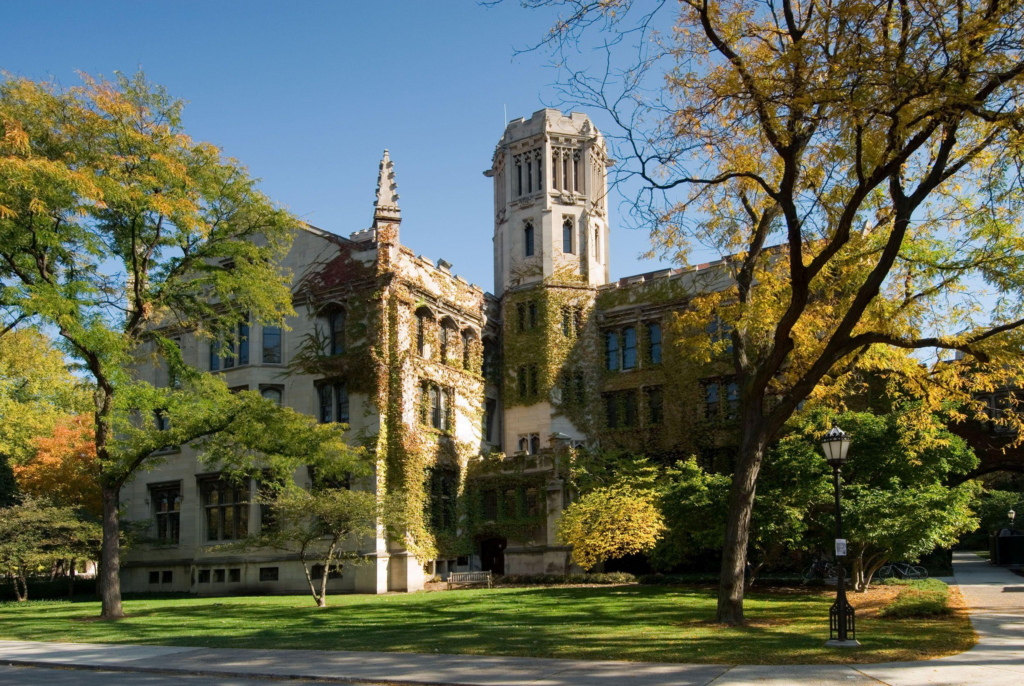Which are the top 10 universities in the USA for international students? Are you considering pursuing your higher studies from top Universities in the USA? Education in USA is known throughout the world as one of the best to pursue, especially for international students. The country is one of the leaders in the provision of world-class education, research facilities, academic programs, and multicultural community acceptance. Whether you are interested in business, engineering, sciences or humanities, if you are an Indian student with a Bachelor’s degree aspiring to get a Master’s degree from a foreign country, then you should consider the United States.
Some of the features of the higher education system in America include: having flexible academic structure and inter-disciplinary nature, enabling the learners to specialize or design their own academic program, based on their preferences or pursuits. Further, devoting significant attention to the acquisition of practical experience through internships, research projects, and connections with the business world helps students effectively combat the challenges within the working environment.
Why Study in the USA?
The United States has long been a top destination for international students seeking world-class education and unparalleled opportunities. Here are some reasons why studying in the USA can be an excellent choice:
- Prestigious Universities: The USA is home to numerous prestigious universities that consistently rank among the best in global rankings. These institutions offer exceptional academic programs, world-renowned faculty, and cutting-edge facilities.
- Diverse Range of Programs: From traditional disciplines to niche specializations, American universities offer a vast array of programs catering to diverse academic interests and career aspirations.
- Multicultural Environment: With students from around the world, American campuses are melting pots of cultures, perspectives, and experiences, fostering a rich and inclusive learning environment.
- Research Opportunities: Many US universities are at the forefront of groundbreaking research across various fields, providing students with opportunities to participate in cutting-edge projects and collaborate with renowned scholars.
- Career Prospects: Graduates from top US universities are highly sought after by employers worldwide, thanks to the reputation and quality of education they receive.
- Post-Graduation Work Opportunities: International students often have the opportunity to gain valuable work experience through internships, co-ops, and post-study work authorization programs, enhancing their employability and practical skills.
With its unparalleled academic excellence, diverse cultural landscape, and abundant opportunities for personal and professional growth, the USA remains an attractive destination for international students pursuing higher education.
Benefits of Studying in the USA for International Students
Studying in the USA can be an enriching and transformative experience for international students. Beyond the academic excellence and prestige of American universities, there are numerous benefits that make pursuing higher education in the USA a rewarding choice. Let’s delve into some of the key advantages:
Quality Education and Prestigious Institutions The United States is home to some of the world’s most renowned and prestigious institutions of higher learning. In the QS World University Rankings 2023, 8 out of the top 10 universities globally are located in the USA. Universities like Harvard, MIT, Stanford, and Caltech consistently rank among the top global universities, renowned for their academic rigor, cutting-edge research, and world-class faculty. American universities are known for their state-of-the-art facilities, well-equipped laboratories, extensive libraries, and modern technology, providing students with an exceptional learning environment.
Cultural Diversity and International Community One of the most significant advantages of studying in the USA is the opportunity to immerse oneself in a truly multicultural environment. In the 2021-2022 academic year, the United States hosted over 1 million international students from more than 200 countries, accounting for approximately 5.5% of the total student population. This diversity not only enriches the academic experience but also promotes personal growth, understanding, and cross-cultural communication skills that are invaluable in today’s globalized world. International students have the chance to build a global network, form lifelong connections, and develop a more inclusive and open-minded worldview.
Advanced Research Opportunities The United States is at the forefront of cutting-edge research across various fields, from science and technology to humanities and social sciences. American universities and research institutions account for nearly 25% of global expenditure on research and development (R&D), spending over $683 billion in 2019 alone. For graduate students and aspiring researchers, this environment presents unparalleled opportunities to work alongside distinguished faculty, contribute to groundbreaking discoveries, and gain hands-on experience in their chosen fields.
Post-Graduation Work Opportunities International students who study in the USA often have the opportunity to gain valuable work experience through internships, co-ops, and post-study work authorization programs. In 2021, nearly 223,000 international students participated in the Optional Practical Training (OPT) program, which allows them to work in the US for up to 12 months after completing their studies. These opportunities not only enhance their practical skills and employability but also provide valuable networking opportunities and insights into the American job market. Many universities offer career services and guidance to assist international students in securing internships, co-ops, and post-graduation employment.
Top 10 Universities in the USA for International Students
Massachusetts Institute of Technology (MIT)
MIT (Massachusetts Institute of Technology) is a prestigious private research university near Boston. Founded in 1861, it’s famous for its focus on science, technology, engineering, and math (STEM) fields. Renowned for innovation and entrepreneurship, MIT alumni have launched countless companies and made significant contributions to technological advancements.

| Overview | Acceptance Rate: 6.7% |
|---|---|
| Popular Majors | Computer Science, Electrical Engineering, Mechanical Engineering, Physics, Mathematics, Economics |
| Test Score Requirements | GRE: 330+ (Quant), 160+ (Verbal) TOEFL: 100+ |
| Tuition Fees (Annual) | $53,790 (Undergrad) $53,450 (Grad) |
| Additional Expenses (Estimated) | $18,156 (Room & Board) $3,480 (Other Expenses) |
| Average Post-Grad Salary | $94,600 |
Columbia University
Columbia, in New York City, is an Ivy League research university founded in 1754, making it one of the oldest in the US. Renowned for its rigorous academics across various disciplines, it boasts a world-class medical center and a vibrant campus life fueled by its location in NYC.

| Overview | Acceptance Rate: 5.8% |
|---|---|
| Popular Majors | Economics, Political Science, Computer Science, English, History, Engineering |
| Test Score Requirements | GRE: 330+ (Quant), 160+ (Verbal) TOEFL: 100+ |
| Tuition Fees (Annual) | $64,380 (Undergrad) $52,486 (Grad) |
| Additional Expenses (Estimated) | $17,734 (Room & Board) $3,280 (Other Expenses) |
| Average Post-Grad Salary | $81,600 |
Stanford University
Stanford University, located in California, is a private research university established in 1885. With a focus on innovation and entrepreneurship, it’s known for excellence in a broad range of fields, from humanities and sciences to engineering and medicine. The beautiful Stanford campus fosters a vibrant community known for its academic rigor and groundbreaking research.

| Overview | Acceptance Rate: 4.3% |
|---|---|
| Popular Majors | Computer Science, Electrical Engineering, Management Science & Engineering, Human Biology, Economics |
| Test Score Requirements | GRE: 330+ (Quant), 160+ (Verbal) GMAT: 730+ TOEFL: 100+ |
| Tuition Fees (Annual) | $56,169 (Undergrad) $56,472 (Grad) |
| Additional Expenses (Estimated) | $18,741 (Room & Board) $4,869 (Other Expenses) |
| Average Post-Grad Salary | $94,900 |
Harvard University
Harvard University, in Cambridge, Massachusetts, is the oldest (founded in 1636) and arguably most prestigious university in the US. It’s a private Ivy League research university, known for its exceptional faculty, rigorous academics, and vast resources. Harvard offers a wide range of undergraduate and graduate programs across the humanities, sciences, and professional fields. It boasts a rich history, influential alumni, and a vibrant intellectual community.

| Overview | Acceptance Rate: 3.2% |
|---|---|
| Popular Majors | Economics, Computer Science, Biology, Political Science, Engineering |
| Test Score Requirements | GRE: 330+ (Quant), 160+ (Verbal) GMAT: 730+ TOEFL: 100+ |
| Tuition Fees (Annual) | $54,768 (Undergrad) $51,904 (Grad) |
| Additional Expenses (Estimated) | $19,980 (Room & Board) $4,460 (Other Expenses) |
| Average Post-Grad Salary | $92,300 |
California Institute of Technology (Caltech)
Caltech (California Institute of Technology) is a prestigious private research university in Pasadena, California. With a focus on science and engineering, it’s known for its small student body, intense academics, and cutting-edge research facilities like the Jet Propulsion Laboratory (JPL) that manages NASA missions. Caltech is a powerhouse for scientific advancements and attracts some of the world’s brightest minds.

| Overview | Acceptance Rate: 6.4% |
|---|---|
| Popular Majors | Physics, Chemistry, Mathematics, Computer Science, Engineering |
| Test Score Requirements | GRE: 330+ (Quant), 160+ (Verbal) TOEFL: 100+ |
| Tuition Fees (Annual) | $58,680 (Undergrad) $56,766 (Grad) |
| Additional Expenses (Estimated) | $17,481 (Room & Board) $4,092 (Other Expenses) |
| Average Post-Grad Salary | $91,600 |
University of Chicago
The University of Chicago (UChicago) is a highly-regarded private research university located in Chicago, Illinois. Founded in 1856, it boasts a strong tradition of academic excellence and influential research. UChicago offers a broad range of undergraduate and graduate programs, with particular strengths in economics, law, and medicine. Its urban setting provides unique opportunities for students to engage with real-world issues.

| Overview | Acceptance Rate: 6.2% |
|---|---|
| Popular Majors | Economics, Statistics, Computer Science, Biology, Public Policy |
| Test Score Requirements | GRE: 330+ (Quant), 160+ (Verbal) TOEFL: 100+ |
| Tuition Fees (Annual) | $59,298 (Undergrad) $62,458 (Grad) |
| Additional Expenses (Estimated) | $17,004 (Room & Board) $3,060 (Other Expenses) |
| Average Post-Grad Salary | $77,800 |
New York University (NYU)
New York University (NYU) is a private research university in the heart of New York City. Founded in 1831, it’s known for its large, diverse student body and extensive academic offerings across 20 schools, including renowned programs in the arts, sciences, business, and engineering. NYU leverages its NYC location to provide students with unique access to internships, cultural experiences, and a dynamic learning environment.

| Overview | Acceptance Rate: 12.2% |
|---|---|
| Popular Majors | Business, Visual and Performing Arts, Liberal Arts, Engineering, Computer Science |
| Test Score Requirements | GRE: 320+ (Quant), 160+ (Verbal) GMAT: 720+ TOEFL: 100+ |
| Tuition Fees (Annual) | $57,770 (Undergrad) $38,368 (Grad) |
| Additional Expenses (Estimated) | $19,122 (Room & Board) $4,082 (Other Expenses) |
| Average Post-Grad Salary | $74,300 |
University of Pennsylvania (UPenn)
The University of Pennsylvania (UPenn) is a private Ivy League research university in Philadelphia, Pennsylvania. Founded by Benjamin Franklin in 1740, it’s one of the oldest universities in the US. UPenn offers a rich academic experience with renowned programs in various fields, including medicine (Perelman School of Medicine), business (Wharton School), engineering, and the liberal arts. Known for its vibrant campus life and strong emphasis on interdisciplinary learning, UPenn fosters a community of intellectual curiosity and innovation.

| Overview | Acceptance Rate: 7.7% |
|---|---|
| Popular Majors | Finance, Management, Economics, Computer Science, Nursing |
| Test Score Requirements | GRE: 330+ (Quant), 160+ (Verbal) GMAT: 730+ TOEFL: 100+ |
| Tuition Fees (Annual) | $59,244 (Undergrad) $49,916 (Grad) |
| Additional Expenses (Estimated) | $16,840 (Room & Board) $5,088 (Other Expenses) |
| Average Post-Grad Salary | $85,900 |
Yale University
Yale University, situated in New Haven, Connecticut, is a prestigious private Ivy League research university. Established in 1701, it’s the third-oldest university in the US. Renowned for its rigorous academics and beautiful collegiate Gothic campus, Yale offers a broad range of undergraduate and graduate programs in the humanities, sciences, and professional fields. With a focus on research and scholarship, Yale has produced numerous Nobel laureates and influential figures.

| Overview | Acceptance Rate: 4.5% |
|---|---|
| Popular Majors | Computer Science, Economics, Biology, History, English |
| Test Score Requirements | GRE: 330+ (Quant), 160+ (Verbal) TOEFL: 100+ |
| Tuition Fees (Annual) | $59,950 (Undergrad) $45,800 (Grad) |
| Additional Expenses (Estimated) | $17,600 (Room & Board) $3,600 (Other Expenses) |
| Average Post-Grad Salary | $84,700 |
Cornell University
Cornell University rounds out the Ivy League bunch! Located in Ithaca, New York, it’s a unique blend of private and public, established in 1865 by Ezra Cornell and Andrew Dickson White. They envisioned a university with a practical bent alongside strong academics. Cornell offers a vast array of programs across its undergraduate colleges and graduate schools, with particular strengths in agriculture, engineering, and business (Cornell Tech). It’s known for its beautiful campus setting overlooking Cayuga Lake and its commitment to groundbreaking research.

| Overview | Acceptance Rate: 8.7% |
|---|---|
| Popular Majors | Computer Science, Engineering, Business, Biology, Hotel Administration |
| Test Score Requirements | GRE: 320+ (Quant), 160+ (Verbal) TOEFL: 100+ |
| Tuition Fees (Annual) | $61,166 (Undergrad) $30,038 (Grad) |
| Additional Expenses (Estimated) | $16,898 (Room & Board) $3,098 (Other Expenses) |
| Average Post-Grad Salary | $80,100 |
How International Students Can Get into a Top US University
Getting admitted to a top university in the USA can be a competitive and challenging process for international students. However, with proper planning, preparation, and a strong application, it is achievable. Here are some key steps and considerations:
Application Process Overview

The application process for international students typically involves the following steps:
- Researching and selecting universities: Identify universities that align with your academic interests, career goals, and preferences.
- Gathering required documents: This may include academic transcripts, standardized test scores (GRE/GMAT/TOEFL/IELTS), letters of recommendation, personal statements, and financial documents.
- Applying for admission: Most universities accept applications through online portals or common application systems like the Common App or Coalition App.
- Applying for financial aid (if needed): International students can apply for university-specific scholarships, external scholarships, and federal student loans.
- Receiving admission decisions: Universities will communicate their admission decisions, typically between March and April for fall intake.
Accepting the offer and making necessary arrangements: Successful applicants must accept the offer, secure student visas, and make housing and travel arrangements.
Preparing a Strong Application
A strong application can significantly increase your chances of getting into a top US university. Here are some tips:
- Personal Statement: Your personal statement should be compelling, well-written, and highlight your unique experiences, goals, and perspectives. It should showcase your writing skills and personality.
- Letters of Recommendation: Request letters of recommendation from professors or professionals who can speak to your academic abilities, leadership qualities, and potential for success.
- Standardized Tests: Prepare thoroughly for standardized tests like the GRE, GMAT, TOEFL, or IELTS, as these scores are an essential part of your application. Aim for scores within or above the university’s recommended ranges.
- Extracurricular Activities: Highlight your involvement in extracurricular activities, volunteer work, internships, or research projects, as these demonstrate your well-rounded interests and skills.
- Academic Transcripts: Maintain a strong academic record throughout your undergraduate studies, as universities place significant emphasis on your academic performance.
By crafting a compelling and well-rounded application, you can increase your chances of standing out among the competitive applicant pool for top US universities.
How to Find a University That Best Fits You
With thousands of universities and colleges in the USA, finding the right fit can be a daunting task. However, by carefully assessing your goals, interests, and preferences, you can narrow down your options and identify the institutions that align with your aspirations.

Assessing Your Goals and Interests
Before you begin your university search, take some time to reflect on your academic and career goals. Ask yourself the following questions:
- What subject area or major are you interested in pursuing?
- Do you prefer a more theoretical or practical approach to learning?
- Are you interested in pursuing research opportunities or internships?
- Do you have any specific career paths or industries in mind?
Clearly defining your goals and interests will help you identify universities that offer strong programs and resources in your desired field of study.
Researching University Programs and Rankings
Once you have a clear idea of your goals and interests, research universities that excel in those areas. Consult reputable university rankings and program-specific rankings to get a sense of the top institutions for your chosen field. Additionally, explore the course offerings, faculty expertise, research facilities, and industry collaborations at your prospective universities.
Considering Campus Life and Location
While academic programs are the primary consideration, campus life and location can significantly impact your overall experience. Consider factors such as campus size, student population, campus culture, housing options, and extracurricular activities. Additionally, think about whether you prefer an urban, suburban, or rural setting, and factor in the cost of living in different regions.
Evaluating Support Services for International Students
As an international student, it’s essential to consider the support services and resources available to you. Look for universities that offer comprehensive orientation programs, academic advising, career counseling, and dedicated international student services. These resources can help you navigate the unique challenges and cultural adjustments that come with studying abroad.
By carefully evaluating these factors, you can identify universities that not only provide an excellent academic experience but also align with your personal preferences, ensuring a fulfilling and enjoyable journey as an international student in the USA.
Conclusion
Choosing the right university is an important decision that will impact your academic and personal growth. Take the time to research your options, talk to advisors and current students, and attend information sessions. The more you know, the better your decision will be. Studying in the USA allows you to experience a new and dynamic learning environment. The skills and knowledge you’ll gain, along with personal growth and global connections, will benefit you in your future.




